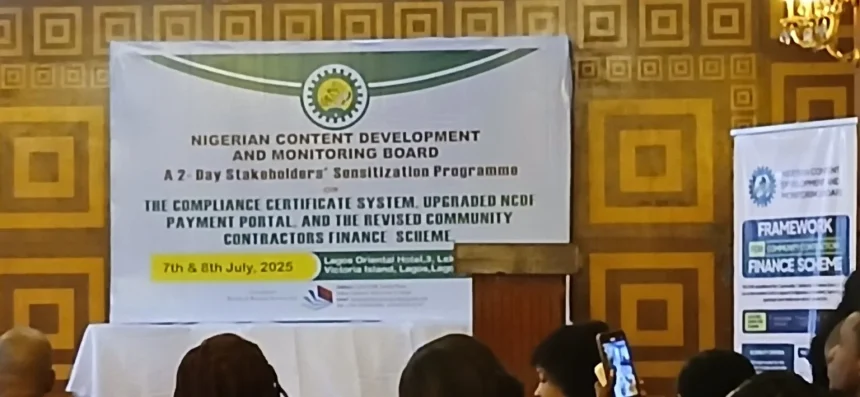The Nigerian Content Development and Monitoring Board (NCDMB) has launched a sensitisation campaign aimed at educating contractors and stakeholders on the Nigerian Content Compliance Certificate (NCCC) system.
The NCCC system is a key regulatory tool for ensuring compliance in the oil and gas sector.
Speaking at a two-day sensitisation programme in Lagos on Tuesday, the Executive Secretary of NCDMB, Mr Felix Omatsola, said the initiative is part of the Board’s strategic effort to deepen Nigerian Content and strengthen transparency and accountability across the industry.
He was represented by Mr Mubarak Zubair, Acting Director of Finance and Personnel Management.
Omatsola said, “The Compliance Certificate System was developed to ensure Nigerian Content requirements are met in all oil and gas projects.

“With this new system, companies now have a clear, objective standard for demonstrating compliance, while the Board enhances its regulatory oversight capabilities.”
He emphasised that adequate stakeholder education is vital for the success of the initiative.
“This programme is more than a workshop; it is a reaffirmation of our commitment to expand Nigerian Content and improve access to funding mechanisms that support indigenous participation,” he said.
The NCBMD boss said that the programme focused on the compliance certificate system, the upgraded Nigerian Content Development Fund (NCDF) Payment Portal, the revised Community Contractors Finance Scheme and updates on the Nigerian Content Intervention (NCI) Fund.
Omatsola highlighted that the upgraded NCDF payment portal marks a significant step toward efficiency.
He said that the portal now features improved user experience, simplified remittance processes, and real-time compliance tracking, all designed to accommodate the expected increase in inflows following the adoption of the new certification process.
He also introduced the revised Community Contractors Finance Scheme, a targeted initiative developed in collaboration with First City Monument Bank (FCMB) and other financial institutions.
He said that the updated scheme aims to remove access barriers and increase participation from genuine host community contractors.
“This initiative is directly aligned with our goal of enabling shared prosperity and inclusive growth within the oil and gas ecosystem,” Omatsola noted.
The executive secretary also discussed the impact and ongoing challenges of the Nigerian Content Intervention Fund, a $400 million facility jointly managed by the Bank of Industry (BOI) and NEXIM Bank.
“So far, over 130 companies have benefited from the fund across various product lines.
“Work is ongoing to expand access and ensure even more indigenous businesses can tap into these vital financial resources,” he said.
Omatsola encouraged all attendees to engage fully during the sessions, “As we proceed, I urge you to participate actively; ask questions, share your insights, and take full advantage of the expertise provided by our facilitators.”
He also acknowledged the board’s partners—Vascon Solutions, FCMB, NEXIM Bank, BoI, and the implementing consultants—for their continued collaboration and support.
“Together, we are building systems and solutions that serve not only today’s needs but also the future of Nigerian Content,” he concluded.
The News Agency of Nigeria (NAN) reports that the event attracted over 200 participants from companies operating in Lagos, Port Harcourt, Warri, Bayelsa, and other oil-producing regions



